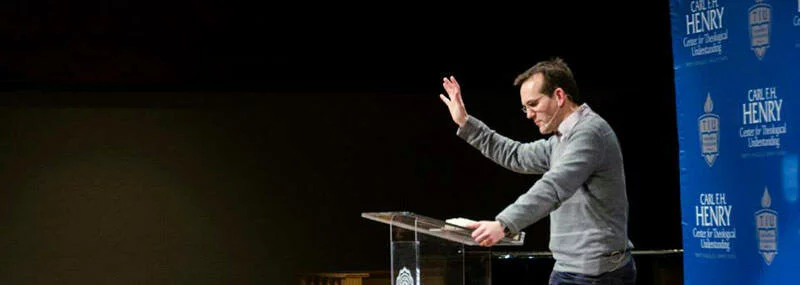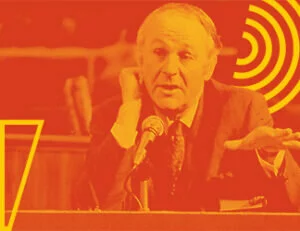Combining his pastoral experience and scholarly interest in Jonathan Edwards, Pastor Josh Moody of College Church delivered a timely and practical message for the TEDS community drawing from the life, work, and ministry of Edwards.
As part of the Jonathan Edwards & the Church series, Moody presented The Theocentric Vision of Jonathan Edwards: A Hands-On Guide for Pastors. Noting that Edwards is often caricatured in popular culture as a hellfire and brimstone preacher or as part of a catchy t-shirt design, Moody wanted to recapture Jonathan Edwards as “a resource for doing authentic and effective Christian ministry within the context of contemporary Western secularism.” Edwards was an intellectual giant, a philosophical genius, and a theological “Mozart,” but the heart of what Edwards offers the church is his identity and ministry as a pastor done in the context of the Enlightenment – the precursor to Western secularism. Moody shared five areas that Edwards touches in his pastoral insight and experience: preaching, revival, mission, church, and university/mind.
Preaching
Edwards’ most distinct contribution to the discipline of preaching is his emphasis on “affectional preaching.” In affectional preaching, Edwards targeted the biblical concept behind the heart – the thinking, feeling, and willing unit of the whole person. He offers three tools for preaching affectually. First, our own hearts must be affected by what we preach. The truth of the Bible must penetrate into every crevice of our hearts. The ways in which we have been shaped by an idea will be communicated in our preaching. Second, we must do justice to the affections of the text. Various texts do various things – they plead, rejoice, love, glory, and hope – and it’s not our job to make the text more exciting by introducing external ideas but by preaching the tone that is already there. Third, we should be intentional about the language we employ in our preaching. Somehow in God’s economy, words have power and the way in which we craft them can bring biblical ideas to life.
Revival
As the theologian of revival, Edwards also offers us a number of helpful correctives for our understanding of revival. First, in Edwards’ thinking, one of the generators of revival is clarity about the nature of the gospel. In particular, Edwards recognized and articulated the importance of justification by faith, which became a significant engine for the beginning of the First Great Awakening. Second, Edwards also noted how God used testimonies of certain people to generate a similar desire in others for powerful encounters of God. Third, Edwards believed in the centrality of prayer. He organized concerts of prayer – corporate gatherings where God’s people united their hearts for the purpose of prayer. There is a tendency in revivals to elevate experience at the expense of doctrinal clarity or prayer, but Edwards emphasized all three.
Mission
Edwards also had a particular desire for promoting missions. He wrote The Life of David Brainerd which had a profound effect on individuals like William Carey and Hudson Taylor and the broader modern missionary movement as a whole. With much discussion around the church’s missions and missional living, Edwards’ distinct contribution was his emphasis on the cost of missions. If we want to take the gospel to the ends of the earth, it is going to cost us something – namely, things that we don’t want to give up. There is no “easy-believism” in Edwards’ theology of mission.
Church
Today, there is debate around the extent in which Edwards was a theologian of the church. Yet throughout his life and writings there is ample evidence of his strong commitment to the local church. Edwards preached his famous sermon A Burning and Shining Light in which he offered a model of what it means to be a pastor. Pastors are first and foremost ministers of the Word. Pastors are often characterized by both priestly and prophetic functions, and Edwards was a champion of the latter category as a champion of the heralded Word of God.
University & Mind
Edwards also believed that the Bible is not a prison for the mind but is rather a seed that grows the mind. The genius of Edwards is that he was able to walk the delicate line between creativity and orthodoxy. While many are rightly afraid of creative orthodoxy, Edwards championed a sort of orthodox creativity, believing that witnessing the creative world around us is just as miraculous as witnessing God at creation. We must draw from these experiences and observations in our theological enterprise if we are to avoid the dry orthodoxy that plagues so many.
Throughout the lecture, Josh Moody not only presented Edwards as a forefather who may continue to speak to the church today, but also as himself a pastor who had been affected by Edwards.




Comments
Be the first one to make a comment!